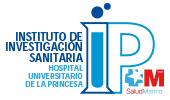Personalised medicine in solid tumours
Our clinical research is focused on the development of new anti-cancer therapies for breast cancer, particularly in the field of monoclonal HER2 antibodies and human breast cancer biomarkers. We have contributed to the clinical evaluation of triweekly trastuzumab, currently the therapeutic standard for HER2+ breast cancer, or HER2 tyrosine kinase inhibitor neratinib in advanced breast cancer. We have also evaluated new drug combinations, including antiangiogenic drugs such as nintedanib or dovitinib in phase I and phase II trials.
The research line of our laboratory is focused on interactions between fatty acids and oncogenes. In the past, we have demonstrated the therapeutic effects in vitro and in vivo of pharmacological inhibition or interfering RNA targeting fatty acid synthase (FASN) in breast cancer. Our preliminary data on immortalised FEMs generated from a conditional knockout mouse model for FASN suggest that FASN is required for transformation.
In non-genetically modified mouse embryonic fibroblasts, the effects of genetic elimination have no impact on cell cycle, survival or cell metabolism; the deletion of FASN, however, severely affects the ability to acquire the metabolic characteristic of cancer, the Warburg effect, by exposing oneself to transformation-inducing stimuli. We have hypothesised that genetic ablation of FASN using an inducible knockout model will prevent the development of breast carcinomas in vivo due to its role in generating the connection between the Warburg effect and anaplerotic displacement of the Krebs cycle.
Our experiments will generate and characterise three multitransgenic animal models of breast cancer (representing the subtypes ER+, HER-2+ and triple negative), which will allow us to establish whether FASN has a crucial role during and after breast tumourigenesis. We will also determine which metabolic mechanisms underlie the limiting nature of FASN in breast transformation. Finally, we will establish the validity of FASN as a safe target by evaluating the effect of systemic deletion of FASN in adult mice. Our project will establish whether FASN is a new “drug-treatable” metabolic target for the chemical prevention of breast cancer.
Finally, we have been involved in public policies related to the National Cancer Strategy organised by the Spanish Ministry of Health, which have included the development of indicators for breast and colon cancer care, and the evaluation of these indicators in Spain.
Team members

Group leader: Ramón Colomer Bosch Hospital Universitario La Princesa |
Other team members:
|
Colomer Bosch, Ramón. Una nueva estrategia metabólica para la prevención del cáncer de mama. PI14/00726. ISCIII. 2015-2017.
Colomer Bosch, Ramón. Discovery, validation and implementation of biomarkers for precision oncology. PIE15/00068. Coordinated project. ISCIII. 2016-2018.
Colomer Bosch, Ramón. Doble amplificación con relevancia terapéutica en cáncer de mama hormonodependiente. PI17/01865. ISCIII. 2018-2020.
Estudio de la asociación en mecanismos de acción desde un punto de vista clínico y experimental en el cáncer de mama hormonopositivo.
This grant is funded by the 2013-2016 Spanish Science, Technology and Innovation Research Plan and the ISCIII – Subdirectorate General for Evaluation and Promotion of Research – and co-financed by the European Regional Development Fund, Operational Programme Smart Growth 2014-2020 according to Regulation (EU) no. 1303/2013.

Romero Laorden, Nuria. Biomarcadores de respuesta inmune en pacientes con cáncer de próstata resitente a la castración (CPRC). PI17/00801. ISCIII. 2018-2020.
Estudio de factores pronósticos mediante cohortes prospectivas en cáncer de próstata resistente a la castración.
This grant is funded by the 2013-2016 Spanish Science, Technology and Innovation Research Plan and the ISCIII – Subdirectorate General for Evaluation and Promotion of Research – and co-financed by the European Regional Development Fund, Operational Programme Smart Growth 2014-2020 according to Regulation (EU) no. 1303/2013.

Leyland-Jones B, Colomer R, Trudeau ME, Wardley A, Latreille J, Cameron D, Cubedo R, Al-Sakaff N, Feyereislova A, Catalani O, Fukushima Y, Brewster M, Cortés J. Intensive loading dose of trastuzumab achieves higher-than-steady-state serum concentrations and is well tolerated. J Clin Oncol 2010. 28:960-966. FI: 18,970(Q1). PMID: 20026806. DOI: 10.1200/JCO.2009.23.1910.
Quintela-Fandino M, Colomer R. Prediction of response to targeted therapies in lung cancer using dynamic imaging: still far from clinical implementation. J Clin Oncol 2011. 29:3716-3718. FI: 18,372(Q1). PMID: 21860002. DOI: 10.1200/JCO.2011.37.1427.
Borrás Andreu, Josep María. Evaluación de la práctica asistencial oncológica. Estrategia en Cáncer del Sistema Nacional de Salud Informe Ejecutivo / Comité Técnico: Juan Jesús Cruz Hernández, Ramón Colomer Bosch, Carmen Corral Romero, Ana Fernández Marcos, Carmen Menéndez Llaneza, Paz Gatell Maza, Antonia Gimón Revuelta, Ismael Herruzo Cabrera, Mercedes Marzo Castillejo, Alfredo Ramos Aguirre, Hermenegildo Marcos Carreras, Francisco Luis Gil Moncayo, José Luis Ramos Rodríguez, Tomás Acha García, Antonio Pascual López, Dulce Ramírez Puerta, Juana Sánchez Jiménez, Alberto Ruano Raviña, Nieves Ascunce Elizaga, Eugenio Santos de Dios, Vicente Guillem Porta, Blanca López Ibor. Ministerio de Sanidad, Servicios Sociales e Igualdad: Madrid, 2013.
Quintela-Fandino M, Urruticoechea A, Guerra J, Gil M, Gonzalez-Martin A, Marquez R, Hernandez-Agudo E, Rodriguez-Martin C, Gil-Martin M, Bratos R, Escudero MJ, Vlassak S, Hilberg F, Colomer R. Phase I clinical trial of nintedanib plus paclitaxel in early HER-2-negative breast cancer (CNIO-BR-01-2010/GEICAM-2010-10 study). Br. J. Cancer 2014. 111: 1060-1064. FI: 4.836(Q1). PMID: 25058346. DOI: 10.1038/bjc.2014.397.
Veigel D, Wagner R, Stübiger G, Wuczkowski M, Filipits M, Horvat R, Benhamú B, López-Rodríguez ML, Leisser A, Valent P, Grusch M, Hegardt FG, García J, Serra D, Auersperg N, Colomer R, Grunt TW. Fatty acid synthase is a metabolic marker of cell proliferation rather than malignancy in ovarian cancer and its precursor cells. Int. J. Cancer 2015. 136: 2078-2090. FI: 5.085(Q1). PMID: 25302649. DOI: 10.1002/ijc.29261.









